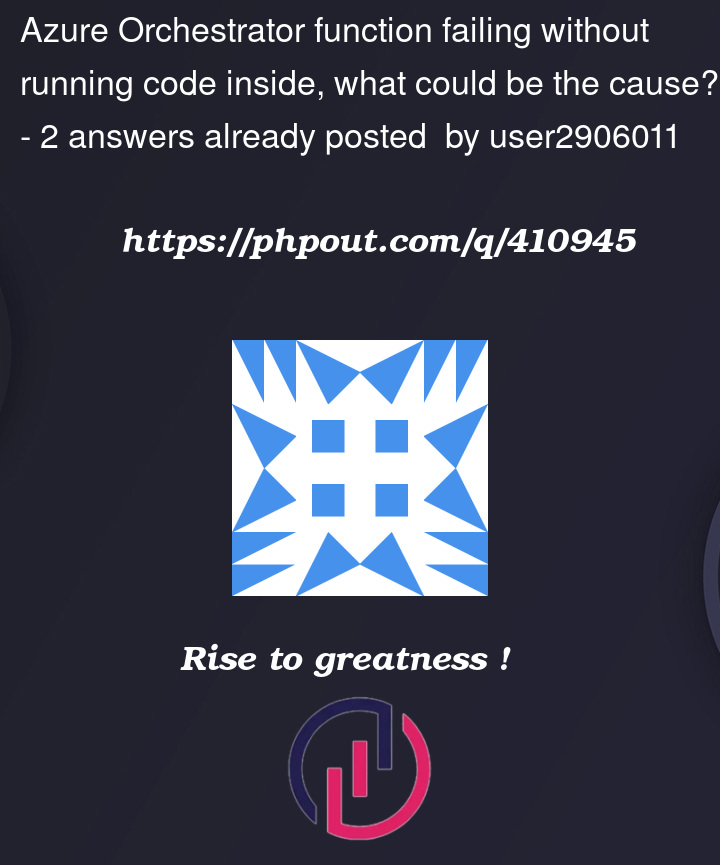I have an http triggered azure function that starts an orchestrator function. In my dev tenant the code runs without a problem but when deploying to another tenant there has been nothing but trouble, in terms of security settings that affect the azure function.
Right now we are able to call the http trigger when connected to the company network via VPN, and the http triggered function runs without a problem. In the logs we can se that the orchestrator function starts, but immediately fails.
We have tested that we are able to connect to the storage account, and we have tried removing all the code inside the orchestrator besides a log-statement. But it still fails.
Is there some settings in the Azure portal that may have been made that only would affect the orchestrator, and not the Http-triggered function?
[FunctionName(nameof(PlannerOrchestrator))]
public async Task<string> PlannerOrchestrator(
[OrchestrationTrigger] IDurableOrchestrationContext context, ILogger log)
{
log.LogInformation("Starting orchestration for Planner request");
return string.Empty;
}
[FunctionName(nameof(PostPlannerTask))]
public async Task<IActionResult> PostPlannerTask(
[HttpTrigger(AuthorizationLevel.Anonymous, "post")] HttpRequest req,
[DurableClient] IDurableClient client,
ILogger log)
{
log.LogInformation("C# HTTP trigger function processed a request.");
var incomingAccessToken = req.Headers.TryGetValue("Authorization", out var tokenHeaderValue) ? tokenHeaderValue.FirstOrDefault()?.Replace("Bearer ", string.Empty) : null;
try
{
bool validToken = ValidateToken(incomingAccessToken);
log.LogInformation("Valid token: {validToken}", validToken);
if (!validToken)
{
return new UnauthorizedResult();
}
}
catch (Exception ex)
{
log.LogError("Invalid token: {ex}", ex.Message);
return new BadRequestResult();
}
var requestBody = await new StreamReader(req.Body).ReadToEndAsync();
var plannerRequest = JsonConvert.DeserializeObject<PlannerRequest>(requestBody);
log.LogInformation("Request received: {request}", requestBody);
var instanceId = nameof(PlannerOrchestrator) + "-" + Guid.NewGuid();
instanceId = await client.StartNewAsync(nameof(PlannerOrchestrator), instanceId, plannerRequest);
log.LogInformation($"Started orchestration with ID = '{instanceId}'.");
return await client.WaitForCompletionOrCreateCheckStatusResponseAsync(req, instanceId, TimeSpan.FromSeconds(60));
}




2
Answers
Figured out the problem. We had no control over creating the function and we found out that they had set it to .NET8 isolated worker, instead of .NET6 In-process.
Had to rewrite the code to .NET8 isolated, then it were able to run successfully.
Check the error logs in
LogStream=>App Insights Logs:Use the below query to check the error logs related to Durable function as mentioned in MSDOC:
I have deployed your code to Azure function app and able to run the function as expected.
Code Snippet:
Durable function:
Deployed to Azure function App.
Portal:
Provide Bearer token in Auth section while running the function:
Response: